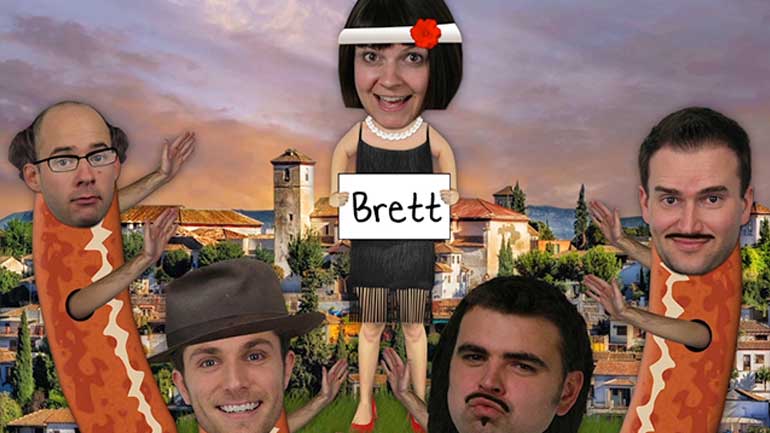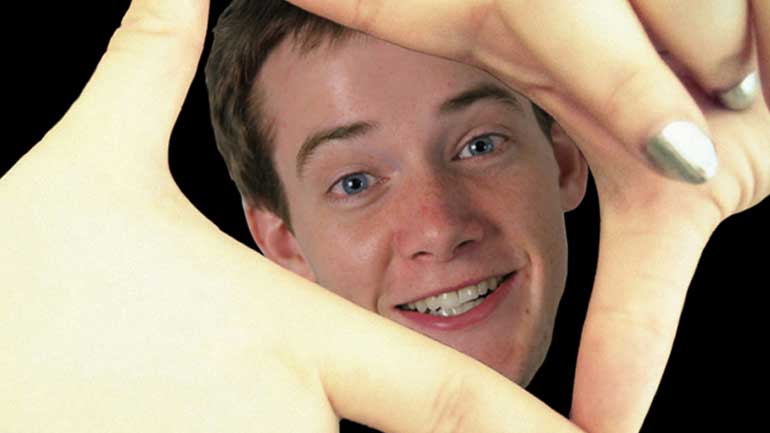ShmoopTube
Where Monty Python meets your 10th grade teacher.
Search Thousands of Shmoop Videos
20th-Century American Literature Videos 31 videos
We wish the Tralfamadorians were as fun as they sound. But unfortunately, they're your garden variety kidnap-humans-and-torture-them type of alien.
The Catcher in the Rye tells the story of Holden Caulfield’s Worst Weekend Ever, and this video tells the story of that story. From losing the fe...
American Literature: Postmodernism 2178 Views
Share It!
Transcript
- 00:02
Post-modernism......
- 00:20
Man I'm starving in here how can we even begin to talk about [Cow discussing post-modernism]
- 00:25
something as important as post-modernism when I'm so hungry I could eat a cow
- 00:29
wait a minute post-modernism has little to do with
- 00:33
fine dining or fast food and more to do with unreliable narrators and testing [Man appears at fast food booth]
Full Transcript
- 00:38
limits it refers to a literary and artistic movement that began after World
- 00:42
War Two was over and still continues to thrive today some 70 plus years later
- 00:47
it's a movement with staying power that's for sure since it included the
- 00:51
likes of gonzo journalist Hunter S Thompson, Beat Generation writer William
- 00:56
S. Burroughs and satirical genius Joseph Heller not only were these post
- 01:01
modernists reacting to modernism they were paving their own way in literary [Man paving a road]
- 01:06
history pretty much everything that modernist held dear post modernists
- 01:10
either questioned or through completely out the window [Joker appears at a window]
- 01:13
for example modernist were fascinated by the up-and-coming psychological
- 01:18
philosophical and political movements of their time post modernists tend to
- 01:22
question everything and are marked by their paranoia and general distrust in [Man asking why is it snowing]
- 01:27
well everything unlike the modernists post modernist scoff at the world around
- 01:33
them instead of celebrating it, take war for example modernists embraced war and
- 01:38
nationalism as an ideal they wrote stories set in war and relationships in war post [People working in factory]
- 01:44
modernists weren't having it their war stories like Heller's catch-22 are
- 01:48
scathing satirical looks at war modernists are also super focused on
- 01:53
self-awareness in their writing and post modernists turned up their noses at this [Girl looking through binoculars]
- 01:57
idea instead they determined that self was merely a human construct or an
- 02:02
ideology and whereas modernist writers felt that self was autonomous from
- 02:07
everything around it post modernists argue that self is inextricably intwined [Society and culture chains attach to self]
- 02:12
with society and culture... postmodern authors like to write by
- 02:18
using what's known as unreliable narrators this means that the person or
- 02:22
people telling the story isn't necessarily to be trusted this calls for
- 02:27
the reader to question everything they're being given by the narrator and
- 02:31
determine for themselves what's real or true and what isn't it can make reading [Girl reading climate change book]
- 02:36
kind of like a fun puzzle if you think about it post modernists aren't afraid
- 02:40
to push the limit and experiment with their art and writing in this way [Scientists working and beaker explodes]
- 02:45
they've been successful in altering people's prior conceptions about what is
- 02:49
and isn't considered great literature nearly every great author you can think
- 02:53
of from 1945 on can be considered part of the postmodern literary canon in some
- 02:59
way or another but as with any movement there are some exceptional standouts
- 03:03
Sylvia Plath was one such author born in Boston in 1932 Plath's short life was [Sylvia facts appear]
- 03:09
marked by depression multiple suicide attempts and some seriously amazing
- 03:14
writing about all of it she is well known for having advanced a type of
- 03:18
writing known as confessional poetry any guesses on what that means people? As
- 03:23
implied by its name confessional poetry is intensely personal deep and sometimes
- 03:28
disturbing poetry... poets confessed on paper in verse where poets of the past [Man reading poem and begins crying]
- 03:33
often distanced themselves more from their writing confessional poets sought
- 03:37
to be aligned with the poem speaker they poured out their deepest secrets and
- 03:41
darkest fears to whoever wanted to read them some of the major topics or themes
- 03:45
in confessional poetry are mental illness, sexuality, personal trauma and
- 03:50
Beyonce alright not Beyonce anyway, Plath's writing outlined her real-life struggles
- 03:56
but tragically even after spending time in mental facilities for treatment [Plath in a padded room]
- 04:00
Plath took her own life at only 30 years of age, she had some success during
- 04:04
her lifetime with a writing but was awarded a Pulitzer Prize for her work
- 04:08
The Collected Poems time to check out one of Plaths wildly confessional poems
- 04:12
this one simply called Daddy... can you imagine what it's about instead of
- 04:17
guessing just read the poem now.....
- 04:48
Okay this is a seriously intense poem was it what you
- 04:52
were expecting with a title like daddy either way this is a deep piece of [Man angry at poem and head explodes]
- 04:56
poetry and we're going to break it down into smaller more easily digestible
- 05:00
bites first off who's the speaker of this poem...
- 05:03
remember post modernist writers like to blur that line between author and
- 05:07
speaker in poetry so as the speaker Plath herself writing
- 05:10
about her own feelings toward her father the best answer is yes and no...Though there [Yes and No ticked]
- 05:15
are several similarities between the daddy referenced in the poem and Plath's
- 05:19
own dad but they aren't quite enough to assume that the speaker in Sylvia are
- 05:23
one and the same person Plath created a speaker in her likeness but distanced [Plath looking at herself in a mirror]
- 05:28
herself enough from the poem and she was able to use some poetic license
- 05:31
departure from reality in poetry to make the poem more emotional and engaging to
- 05:36
the reader the imagery in this poem is incredible because it's simple but packs [Man reading poem]
- 05:40
a serious punch it's impossible to read daddy and not have certain images spring
- 05:45
to mind the sheer amount of Holocaust imagery and illusion is staggering for [Families stood together in holocaust]
- 05:50
instance Plath uses the term Luftwaffe the German Air Force Panzer Mana, Panzer
- 05:55
is a German tank and Mein Kampf, the title of Adolf Hitler's autobiography
- 06:00
all of these images have direct connotations to the atrocities and pain
- 06:04
that came from World War two remember this poem was written during the
- 06:09
relatively early postmodern days 1962 when the Second World War had just [soldiers carrying wounded man]
- 06:14
recently ended and the evil of Hitler and his minions still permeated
- 06:18
everyone's mind using specific references in this way was powerful and
- 06:23
Plath knew it whether or not her relationships with her father and
- 06:26
husband were as bad as the speaker makes them out in this poem isn't directly
- 06:30
known but using war and Nazi imagery is enough to make anyone cringe while
- 06:34
reading this poem by using compelling symbols and imagery in the way that she
- 06:39
did Plath sets a dismal tone to the poem from the jump another interesting way
- 06:44
that she plays up the tone in this poem is by her use of rhyme and meter [Rhyme and meter meaning appears]
- 06:48
even though Plath doesn't subscribe to one formal rhyme scheme so postmodern of
- 06:53
her there are rhymes throughout the poem
- 06:55
typically we think of rhyming poetry to be for kids like Nursery Rhymes or dr.
- 07:00
Seuss so when Plath uses singsong type rhymes
- 07:03
and Daddy it kind of just makes it super creepy you can imagine that maybe Daddy [Father stood beside daughters bed]
- 07:08
recited nursery rhymes to his daughter then she turned these pleasant little diddies
- 07:12
into something scathing and evil yep that's a postmodern twist if I've [People dancing]
- 07:17
ever seen one we've only skimmed the surface of Plaths life and awesome verse
- 07:21
but because the era of postmodern literature is so big and still growing
- 07:26
we're going to meet a completely different sort of writer from the same
- 07:29
canon..... Kurt Vonnegut jr. was born in 1922 in Indianapolis to German parents after
- 07:35
World War one people weren't all that stoked on the Germans so his parents
- 07:39
refused to teach him the language or about the culture he started college at
- 07:43
Cornell but dropped out and joined the army to serve in World War two during [Kurt in army clothing]
- 07:47
the war Vonnegut was captured by the Germans when the Allied forces bombed
- 07:51
the city of Dresden he hid in a meat locker in a slaughterhouse and the title [Kurt hiding in a slaughterhouse]
- 07:56
of his best loved and most popular novel slaughterhouse-five a book about the
- 08:00
horrors of war and also aliens and time travel post-modernism anyone? after
- 08:06
returning from the war Vonnegut published his first novel in 1952 but it
- 08:10
wasn't a huge success that didn't stop him slaughterhouse-five was Vonnegut [Slaughterhouse-five book appears]
- 08:15
sixth published effort and the one that sent him skyrocketing into fame...Vonnegut
- 08:20
is notorious among the big names of post-modernism for several reasons his
- 08:24
personal experience in and feelings about the war shaped a lot of his [Kurt vandalizing wall]
- 08:28
writing he wasn't afraid to try experimental literary techniques employ
- 08:33
unreliable narrators and became known as an absolute king of irony and satire
- 08:38
we're going to pause here and read one of Vonnegut short stories; Harrison
- 08:43
Bergeron.... come right on back when you're finished
- 08:47
all set? nice speaking of set Harrison Bergeron is set
- 08:53
in the future 2081 and everybody was finally equal [Plane flys by carrying everybody equal banner]
- 08:57
because Vonnegut opens the story in this way we know that the equality among
- 09:02
humans is a major theme, instead of everyone achieving the American dream of
- 09:06
becoming wealthy and equal people are equal because their innate talents like
- 09:10
intelligence or good looks are being suppressed the lowest common denominator [Bag falls on man's head]
- 09:15
is the marker for equality yikes smart people have to wear mental
- 09:21
handicap radios to keep them from excelling in brainy pursuits beautiful
- 09:26
people have to hide their faces so that no one is able to feel jealous of their [girl with bag over her face]
- 09:30
looks sounds equal right? in conjunction with equality is the theme of
- 09:36
competition in today's America we can't imagine life without some healthy [People arm-wrestling]
- 09:40
competition nearly everyone has preferred sports teams is up for a round
- 09:45
of apples-to-apples at family gathering and hurries to get to the best place in
- 09:48
line at the grocery store or to get into a concert in Harrison Bergeron none of
- 09:53
these things could even happen because someone would ultimately be a winner and [Football goes over goalposts]
- 09:57
other people would be losers that's not equal what would happen if these healthy
- 10:01
forms of competition were taken away from us where do we draw the line
- 10:05
between healthy and unhealthy competition? these aren't questions with
- 10:08
easy answers but we can't help but to ask them after reading Vonnegut's
- 10:12
cautionary tale Vonnegut was also commenting on the
- 10:16
practicality of rules and how they can be used to manipulate an entire [Car travelling on the freeway]
- 10:21
population most people would agree that some rules are okay that's why we make
- 10:26
laws and prohibit certain behaviors and why there are punishments if these laws
- 10:30
are broken but once again we have to ask when do rules go too far? In Harrison
- 10:35
Bergeron the rules have been taken to the extreme of people literally wearing [Man wearing necklace of rules in a bath]
- 10:40
them around their necks sheesh by making everyone equal people
- 10:45
really just became too tired and beaten down to care about anything but basic
- 10:50
survival sure everyone might be in the same boat on the sea of equality but [Boat sailing on sea of equality]
- 10:55
does that sound like a life you would like to live? not at all
- 10:59
Vonnegut used satire to comment on the way most people views socialism the
- 11:04
theory that goods should be collectively owned and distributed he seems to be
- 11:08
poking fun at people who think socialism is a bad idea by creating a satorized
- 11:12
future in which socialism has been taken to the utmost extreme and in case you
- 11:17
were wondering Vonnegut was personally a proponent of socialism it all makes [Kurt with giant foam finger in a slaughterhouse]
- 11:21
sense now... Harrison Bergeron is a great example of
- 11:24
postmodern writing because it plays with some very controversial ideas in a
- 11:29
light-hearted but straightforward way, it isn't a story bogged down with flowery
- 11:33
language and descriptions instead it reads almost like a bit of news should [Newspaper appears]
- 11:37
basic to the point just the facts ma'am or sir...
- 11:40
in this case we don't have an unreliable narrator but there's so little
- 11:44
information given that we still have to fill in a lot of the specifics on our
- 11:48
own and that is totally postmodern... Plath and Vonnegut are only two of a huge list
- 11:54
of postmodern writers when an era of writing spans more than seventy years [List of postmodern writers appears]
- 11:58
there are going to be lots of folks included today writers are coming up
- 12:02
with even more innovative ways to expand the postmodern canon can you imagine
- 12:07
what the future holds if you're a post modernist you probably can and I'm [Magic eight ball shows you probably can]
- 12:11
guessing it has a little something to do with the Internet, online dating and cats
- 12:16
just a guess....
Related Videos
“Happy Hunger Games!” Or not. Katniss’s Hunger Games experiences left a not-so-happy effect on her. This video will prompt you to ponder if...
Who's really the crazy one in One Flew Over the Cuckoo's Nest? Shmoop amongst yourselves.
Sure, Edgar Allan Poe was dark and moody and filled with teenage angst, but what else does he have in common with the Twilight series?
¿Por que es el 'Gran' Gatsby tan gran? ¿Porque de su nombre peculiar? ¿Porque de el misterio que le rodea? Se ha discutido esta pregunta por muc...
Would would the world be like without books? Ray Bradbury tackles that question—and many more— in Fahrenheit 451. Go ahead; read it on your Kin...



































